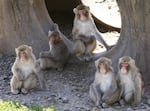
About a dozen of the 175 Japanese macaque monkeys at the Oregon National Primate Center have been found to suffer from Batten disease.
Kristyna Wentz-Graff / OHSU
Scientists at Oregon’s National Primate Research Center recently found some of their Japanese macaque monkeys had developed Batten disease.
The outbreak was naturally occurring and had nothing to do with research, officials said.
An estimated two to four out of every 100,000 children in the U.S. suffer from Batten disease. It affects the function of organelles within cells called lysosomes. They normally break down waste product, much like a cellular garbage disposal. The disease is rare, inherited and fatal in humans. But scientists think the discover of Batten disease in the monkeys could help develop new therapies.
Up to now, most research into Batten disease has been conducted in mice or sheep. Primate center scientist Dr. Jodi McBride says they didn’t even know monkeys suffered from Batten disease.
“Finding something in a non-human primate, whose neurophysiology, brain connections are so much more similar to that of a human really puts us at an advantage,” she said.
The National Institutes of Health immediately started to fund new research to develop gene therapy for Batten disease. So far, only one treatment is available and it’s not widely effective.
McBride thinks new therapies could be tested on humans in five years — perhaps sooner — as the FDA has been known to fast-track research into diseases for which there are few therapies.

